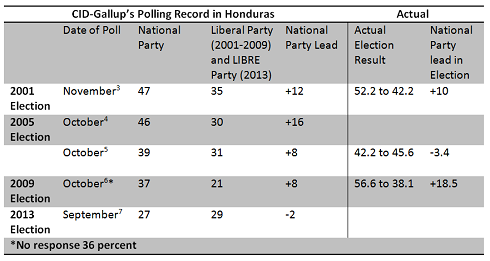October 18, 2013
The imminent Honduran presidential elections have been met with polls published by a surfeit of different polling firms. Unfortunately, however, these are notably inconsistent and show significant differences in their results. While the majority project Xiomara Castro, wife of the deposed President Zelaya, as the winner, there is a notable divergence in the size of the lead. In the scant coverage that they have given, the international press has paid almost exclusive attention to the polls conducted by the noted U.S. polling company, CID-Gallup.
Gallup has a lofty reputation in the U.S. as the first modern pollster. It accurately predicted the result of the 1936 presidential election by using modern sampling methods, and in the process destroyed the reputation of the Literary Digest poll, which had previously been considered the most accurate because of its much larger sample. This demonstrated the importance of representative sampling in order to reliably predict voting intentions. However, in Honduras, Gallup’s polling data has been divergent from actual electoral results, suggesting a bias towards the (right-wing) National Party.
This is important as Gallup is the most prolific, widely quoted and one of the longest standing pollsters in Honduras. In 2005, the last relatively free election in Honduras,1 Gallup in two separate polls predicted poll leads of 8 percent and 16 percent respectively in favor of the National Party candidate, Porfirio Lobo. These polls, coming just weeks before2 the actual election, were remarkably divergent from the actual result that Manuel Zelaya won with 45.6 percent of the vote to Lobo’s 42.2. This raises questions about the reliability of the recent poll by Gallup, paid for by the National Party controlled Congress, ahead of the coming election showing Xiomara Castro de Zelaya with a lead —within the margin of error— of just 2 percent.

While it is credible to suggest that Gallup has a National Party bias given its previous polling record, it is difficult to assess the other pollsters. A firm called Harris Le Vote, which in a 2005 poll recorded a similar lead for Zelaya to the actual result of the 2005 election, released a poll in April showing a lead for Xiomara Castro of 5 points but they have not released any more recent polls.
This is the first election for many of the other polling firms, which means that their reliability cannot be inferred from previous results. There is, however, a marked divergence in the polling results of these new firms. All of them so far show Castro in the lead ranging from TecniMerk, which shows a respectable lead of around 10 points, to Paradigma which shows a lead of 0.9 percent.8 They also diverge strongly in the candidates they position in second place, which alternates between the National Party candidate, Juan Orlando Hernández, and the populist anti-corruption candidate Salvador Nasralla.
Unfortunately, it is difficult to ascertain which of the polling companies is the most reliable. Ultimately polling companies in Honduras, like in other countries in Latin America, tend to be opaque in their methodology and sampling methods, and highly variable in their reliability. A recent poll by Global Business, which did not provide a detailed methodology but did at least acknowledge that it was likely to be biased towards affluent and urban Hondurans, reported a poll lead for Castro of 34.9 percent to 29.6 percent for Nasralla. If this is correct then it implies that the poll lead for Xiomara Castro is closer to the 10 percent lead as shown by TecniMerk than the 1-2 percentage point lead suggested by Gallup and Paradigma.
————————————————————-
1The 2009 election, which National Party candidate Porfirio Lobo won by a landslide, is distinct in that it came after a coup d’etat, and within a context of political repression and extreme disarray in the Liberal Party. , and a boycott by factions of the resistance movement against the coup. There have also been questions raised about the validity of the results.
2 Polling is complicated in Honduras as there is a—frequently broken—electoral law banning the publication of polls for a period prior to elections.
3 AP, “Opposition Party Leading in Honduras Presidential Polls,” The Associated Press, November 15, 2001.
4 AP, “Gobierno de Maduro El Más Corrupto de Honduras, Según Gallup,” The Associated Press, November 03, 2005.
6 http://wvw.aldia.cr/ad_ee/2009/octubre/27/internacionales2138378.html
7 http://www.laprensa.hn/honduras/apertura/390345-98/pol%C3%A9mica-por-resultados-de-cidgallup






